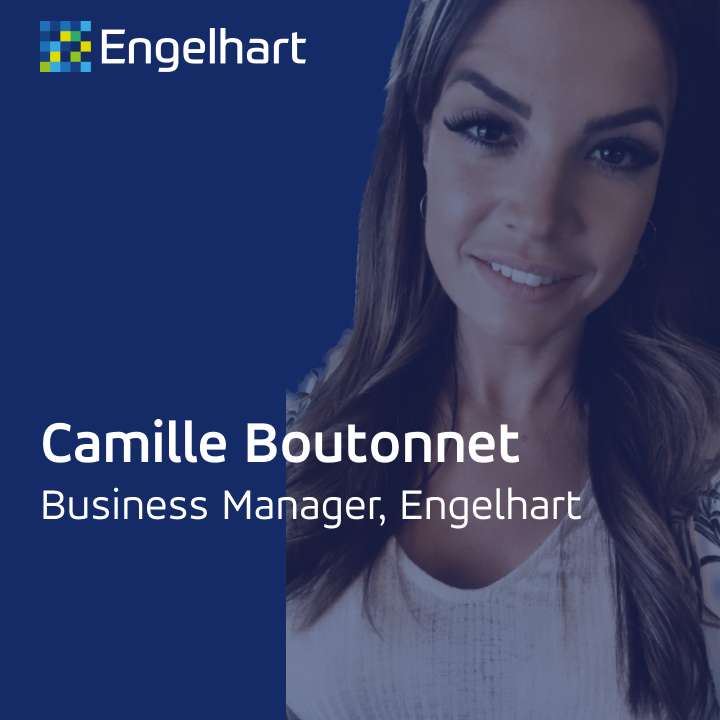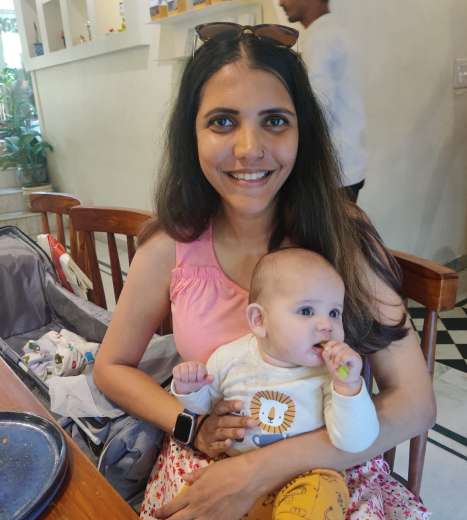
Empowering women in commodities
In this article, we’re celebrating Women’s History Month in March by speaking to women who work in various roles across our global business.
We know that female representation is a work in progress for the commodities industry, but it’s a real priority for us.
We want to understand how we can create more female role models in the industry, support more women to balance motherhood with a career at Engelhart, and the importance of challenging the perception of commodities trading.
Increasing the representation of women at all levels of our business is vitally important. We’ve made some good progress, but we also realise there’s much more to do.
Increasing diversity and boosting the number of women in leadership positions is a huge benefit to our business and the wider sector. It improves the culture and provides a diversity of thought to help avoid an echo chamber of perspectives.
We hope that by bringing the stories of some of the women who work at Engelhart to a wider audience, we can contribute to an industry-wide discussion about greater female representation in commodities.

What’s your role at Engelhart?
My role is to be a link between the various trading desks and Engelhart’s senior management.
I also help facilitate how the business strategy of every trading desk feeds into Engelhart’s overall strategy and vice versa.
There are two parts to my role. The strategic part looks at the relationship between our trading desks and the whole business strategy, and then the tactical part of the job includes all the operational aspects.
For example, if we want to start trading a new product or a new market, then we work to make that as smooth as possible for the traders.
What’s your career journey to this point?
I started in banking when I graduated; my bachelor’s degree and master’s were both in corporate finance. I moved from France to London to work at BNP Paribas as a banking analyst, but I soon realised I was actually more interested in the complexities and the challenges raised by trading commodities.
So, from BNP Paribas, I joined Koch Industries as an energy analyst, where part of my role was to assess risk and assess the financial viability of our counterparties.
I found this really engaging, and when I joined Engelhart in 2018, that was a big part of my job when we had more of a physical trading business.
“I realised I was actually more interested in the complexities and the challenges raised by trading commodities.”
What attracted you to working in commodities?
One of the reasons was the complexity of the regulatory landscape. I’ve always wanted to challenge myself, and commodities trading is definitely challenging! In financial services, there are lots of transactions daily, but most are pretty vanilla; with commodities, you never really know what you’re going to get.
It’s like solving a problem or a puzzle. I find it really interesting and rewarding.
Commodities, and finance more widely, are still male-dominated. How do we get more women to follow in your footsteps?
It’s the elephant in the room, and many commodities and finance businesses are trying to create more gender balance, but it takes time.
There needs to be transparency around the numbers because companies will say they’re balanced, but it might be 50% at junior levels and less than 10% at senior levels.
“The change will only happen once women and younger girls see female leaders in commodities in the boardroom and leading businesses.”
It needs to start much younger, at school age. We need to be in schools marketing our industry to girls.
The typical story is that guys do finance, and girls do marketing or PR. They want to work for Louis Vuitton or Chanel, but that story shows how well those businesses market to young women.
The younger generation is already telling us they need purpose in their career and don’t want to just work for money. We can use that in the commodities industry because we’re involved in so many markets that are vital to how the world works, from energy to climate change to food.
We need to show girls and young women that they can grow and develop a career in commodities trading, and it’s not like The Wolf of Wall Street!

At what point did you become interested in pursuing a legal career?
Early on, probably when I was a teenager.
TV dramas featuring various legal procedures were popular in mainland China then.
Normally there was a powerful attorney figure in the stories, and that just looked exciting to me!
I went to college to study law, and after graduating, I got a job at a law firm. However, I soon realised that it wasn’t anything like the TV show, and it was incredibly demanding mentally and physically.
It was impossible to have a life outside the firm as the days would sometimes go into the early hours, and you’d be expected back in the office a few hours later. I was exhausted, so I quit.
But I still wanted to be a lawyer, and in Shanghai at the time, we were lucky in that there were lots of successful female lawyers, so I had many role models, and I felt like I could still pursue a legal career.
How did you start working in commodities?
A few months after resigning, I applied for a job at Trafigura. I didn’t really have a big interest in finance or commodities at the time; it was more by chance than anything.
I’d had some experience working on energy projects, and I could see how important the work was, so that interested me.
I worked there for nearly 5 years, first as a paralegal and then as Legal Counsel, but then I gave birth to my child and had to make the decision to leave the job to take care of them.
That must have been a difficult decision?
Absolutely, but it was the only option for us at the time. We had no one to help, so I decided to leave my job and spend a year and a half raising my baby.
I said I would do that until they could talk, and then I’d be happy to leave them with someone else to care for when I’m at work.
It was a hard decision, but I don’t regret it.
I realise that I was luckier than some women who take a career break because, after a year and a half, a former colleague offered me the opportunity to join Engelhart, which was known as BTG Pactual Commodities then, and the business has been great at helping me balance my work and motherhood.
“There’s lots of flexibility and trust here.”
You joined Engelhart in 2015. How has the business changed since then?
It’s changed a lot.
When I joined, we were doing physical trading in China, and there were significant legal and regulatory challenges associated with that.
Our business has evolved since then, and my job has evolved too. I’ve taken on more responsibilities and have worked closely with the Managing Director in Asia since 2017.
It’s fantastic that I’ve been able to grow and develop along with the company.
We’ve always had this horizontal and flat structure which really encourages free discussion and that we can challenge each other safely.
We also have senior women in key positions in finance and marketing, for example, so we’re all supportive of each other.
Engelhart is making good progress towards gender balance, but there are still relatively few female traders. Why do you think that is?
It’s true that trading is still male-dominated, and we need to do some work to change that.
Fundamentally it’s about getting younger women and girls interested in finance and commodities at a younger age. It’s important to educate them about how important this industry is to how the world works. It’s such an important part of the economy, and you can make a real difference if you choose it as a career.

How did you become a quant analyst?
I’ve always been attracted to science, engineering and maths.
I did my bachelor’s degree in mechanical engineering and started working at a SaaS business in India.
At one point, I was working on the technical side, developing the software, but our clients were banks, and I started to get really interested in the financial side. I did my master’s in financial engineering.
After my master’s, I worked at Societe Generale in their commodities division in Singapore, then joined Engelhart in 2020 and moved to the US in 2021.
What attracted you to it as a career?
I’ve always been interested in programming languages and maths since my high school days, but it was during my internship at SocGen that people started talking seriously about Python.
I wanted to learn more, so I taught myself how to use it. Quant analysis was relatively new then, and most people (myself included) were still using Excel spreadsheets!
So the challenge of learning a new skill attracted me initially, and then it was all these avenues that Python opened up for me.
My manager jokes that I take notes in Python rather than English!
I love how it allows you to understand data and how to map it, how to make real-world sense of it and build these beautiful models to give traders the best possible tools to be successful.
Nothing will replace the fundamental expertise of individual traders, but quant analysis creates a much richer picture of what’s happening in any market.
Your role is particularly male-dominated – 80/20 male to female by some measures. Is that something you think about?
Of course, you notice it. In my office, it’s majority men by far, and I’d love to see more women represented. It’s important to have a diversity of thinking in any team, and it’s so important to have gender diversity.
It’s not a problem at all in how we do the work, but it’s nice to have that more social element and to talk to other women who share the same experiences.
All the men at Engelhart are really supportive, but it would be great to see more women taking up quant analyst roles.
“It’s important to have a diversity of thinking in any team, and it’s so important to have gender diversity.”
Why do you think more women don’t want to become quant analysts, and how do we solve that?
As an industry, we need to be better at going into schools and colleges and showing young women earlier that this is an option for them.
I know that on my bachelor’s course, it was probably 15% women, which is too small. We need to change how the industry is represented in the media because it’s outdated and no longer true.
Engelhart is a very welcoming and supportive place for women. I would like to see more female role models in higher leadership positions across commodities, so I could speak to them and hear how they’ve managed their career and work/life balance.
On your work/life balance, you recently had a baby. How has it been balancing motherhood with your career?
I gave birth 9 months ago and was back working after 4 months. Luckily my husband is a really supportive partner, and he can handle things really well when he’s working at home, but it’s definitely a challenge.
In those first few weeks back, I was genuinely asking myself, “Do I really need this job?” which is crazy because I love it.

But this is the reality for many women of my age. They must make this hard decision between work and motherhood. That’s why you see so many talented women taking career breaks or leaving work entirely.
The flexibility we have at Engelhart has really helped; the hybrid working model we have means I can work at home for some of the time.
My boss has been super supportive, and that’s given me the confidence to carry on working while balancing being a parent too.
I’d like to see more childcare options supported by workplaces, not necessarily a creche in every office but perhaps local partnerships with childcare centres. That could make those decisions about work/life balance a lot easier.
